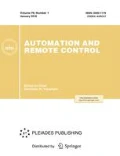Abstract
A new stochastic approximation algorithm with input perturbation for self-learning is designed with test perturbations and has certain useful properties, such as consistency of estimates under almost arbitrary perturbations and preservation of simplicity and performance with the growing size of the state space and increasing number of classes. An example on computer-aided modeling of learning is given to illustrate the performance of the algorithm.
Similar content being viewed by others
REFERENCES
Aizerman, M.A., Braverman, E.M., and Rozonoer, L.I., Metod potentsial’nykh funktsii v teorii obucheniya mashin (The Potential Functions Method in Machine Learning Theory), Moscow: Nauka, 1970.
Fomin, V.N., Matematicheskaya teoriya obuchaemykh sistem (Mathematical Theory of Learning Systems), Leningrad: Leningrad. Gos. Univ., 1976.
Fomin, V.N., Rekurrentnoe otsenivanie i adaptivnaya fil’tratsiya (Recurrent Estimation and Adaptive Filtration), Moscow: Nauka, 1984.
Granichin, O.N. and Polyak, B.T., Randomizirovannye algoritmy otsenivaniya i optimizatsii pri pochti proizvol’nykh pomekhakh (Randomized Estimation Algorithms and Optimization under Almost Arbitrary Perturbations), Moscow: Nauka, 2003.
Haykin, S., Neural Networks: A Comprehensive Foundation, New York: Macmillan, 1984.
White, H., Artifical Neural Networks, Oxford: Blackwell, 1992.
Vidyasagar, M., A Theory of Learning and Generalization with Applications to Neural Networks and Control Systems, London: Springer, 1997.
Poznyak, A.S., Sanches, E.N., and Wen, Yu., Dynamic Neural Networks for Nonlinear Control: Identification, State Estimation and Trajectory Tracking, Singapore: World Scientific, 2001.
Granichin, O.N., Stochastic Approximation with Input Perturbation under Dependent Observation Noises, Vestn. Leningrad. Gos. Univ., 1989, ser. 1, no. 4, pp. 27–31.
Polyak, B.T., Vvedenie v optimizatsiyu, Moscow: Nauka, 1983. Translated under the title Introduction to Optimization, New York: Optimization Software, 1987.
Robbins, H. and Siegmuud, D., A Convergence Theorem for Nonnegative Almost Super-Marlingales and Some Applications, in Optimization Methods of Statistics, Rustagi, J.S., Ed., New York: Academic, 1971, pp. 233–257.
Author information
Authors and Affiliations
Additional information
__________
Translated from Avtomatika i Telemekhanika, No. 8, 2005, pp. 52–63.
Original Russian Text Copyright © 2005 by Granichin, Izmakova.
Rights and permissions
About this article
Cite this article
Granichin, O.N., Izmakova, O.A. A Randomized Stochastic Approximation Algorithm for Self-Learning. Autom Remote Control 66, 1239–1248 (2005). https://doi.org/10.1007/s10513-005-0165-3
Received:
Issue Date:
DOI: https://doi.org/10.1007/s10513-005-0165-3




